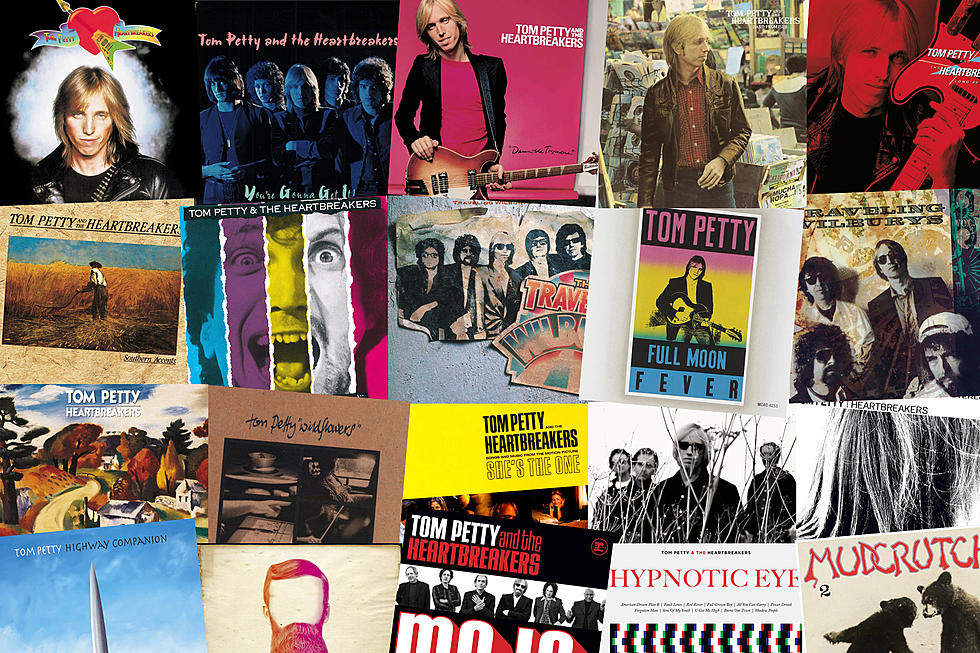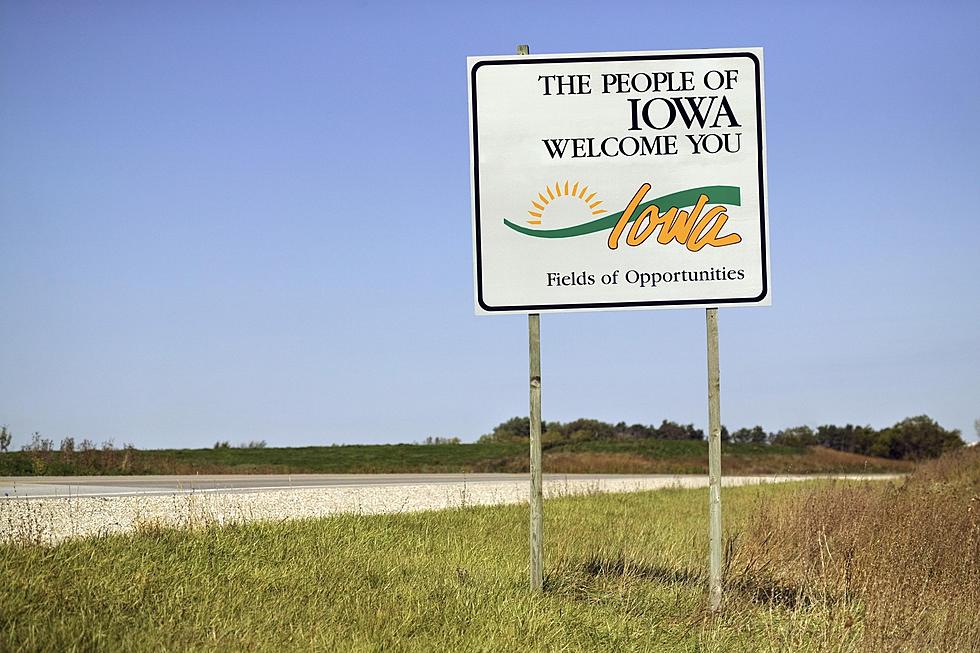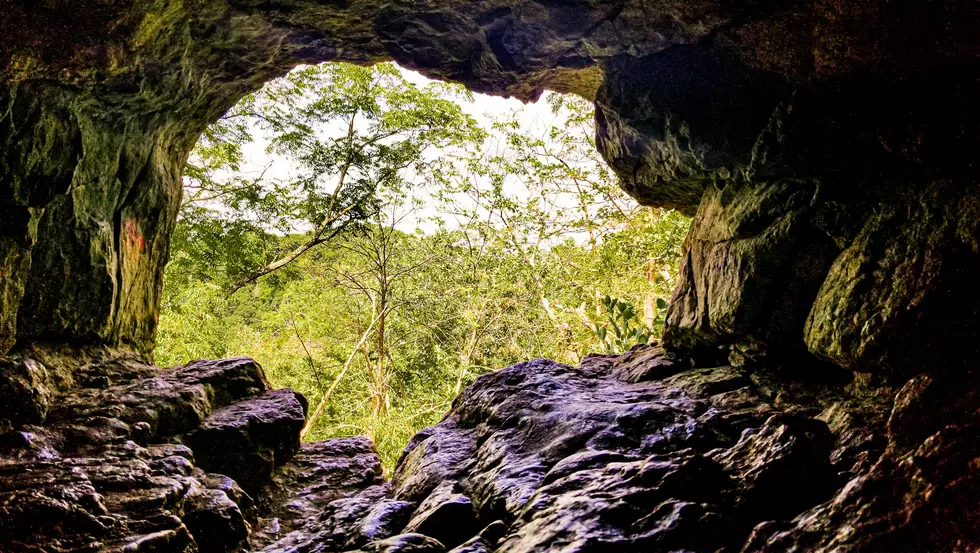
Underrated Tom Petty: The Most Overlooked Song From Each Album
Few have mastered the craft of timeless songwriting like Tom Petty.
He started out humbly in the backwoods of Gainesville, Fla. His first band, Mudcrutch, didn't yield any noticeable mainstream success, but he did take some priceless lessons about leadership and teamwork with him when he and some bandmates formed the Heartbreakers.
After shifting gears and settling in Los Angeles, Petty's early efforts paid off when the Heartbreakers' self-titled debut album made waves in the U.K. which, in turn, led to its success in the U.S. That launched a long road of hit songs, more than a dozen studio albums with the Heartbreakers, one supergroup, three solo records and a late-career Mudcrutch reunion in the years before his 2017 death.
A perfectionist by nature, Petty gave us the very best, but with so many great songs to his name, many are bound to get lost, as you'll see in the below list of Underrated Tom Petty: The Most Overlooked Song From Each Album.
"Luna"
From: Tom Petty and the Heartbreakers (1976)
Tom Petty and the Heartbreakers came out swinging on their debut self-titled album. The record included both "Breakdown" and "American Girl," two of Petty's most popular songs, but between those tracks there's "Luna," which proved the Heartbreakers were a perceptive group of young musicians willing to explore more sensitive and sophisticated avenues. A pitch-bender gives it an air of mystery, while the lyrics - “White light cut a scar in the sky, thin line of silver” - paint a vivid and bewitching moonlit scene.
"No Second Thoughts"
From: You're Gonna Get It! (1978)
According to Petty, the second Heartbreakers album, You're Gonna Get It!, came about quickly - almost too quickly. "Probably should have taken more time with it, looking back," he told Paul Zollo in the 2005 book Conversations With Tom Petty. In "No Second Thoughts," a steady rhythm from a 12-string guitar (an influence of the Byrds, who were a big inspiration on Petty throughout his career) is combined with occasional sitar chimes. Southern charm meets Middle Eastern mysticism.
"Louisiana Rain"
From: Damn the Torpedoes (1979)
With a new producer, Jimmy Iovine, at the helm, Damn the Torpedoes lifted the Heartbreakers from considerably successful rock band to critically acclaimed superstars. But they didn't get there without some difficulties. When the band's label, Shelter Records, was sold to major MCA in 1979, Petty, already wrapped up in an unfavorable contract with Shelter, was forced to declare bankruptcy to void the contract. He somehow managed to scrape together $500,000 to record the album on his own and refused to hand over the tapes until a more agreeable contract could be drawn. To close out the album, "Louisiana Rain" offers a more tender, emotional side of the whole ordeal, recounting travels across the west and through the south: "I may never be the same when I reach Baton Rouge."
"You Can Still Change Your Mind"
From: Hard Promises (1981)
Even though the words and melody are Petty's, the arrangement for the closing song on Hard Promises is largely guitarist Mike Campbell's doing. A wistful ballad with some backing vocals by Stevie Nicks, "You Can Still Change Your Mind," according to Petty, was Campbell's "tribute to Brian Wilson." "I thought it sounded like something that could have been in the Beach Boys' catalog somewhere," Petty said. "Very different from what we normally do."
"Straight Into Darkness"
From: Long After Dark (1982)
While most of Long After Dark's attention landed on the synth-driven single "You Got Lucky," Petty slipped in some other, more vulnerable numbers on the album, too. With a stately piano introduction by Benmont Tench, "Straight Into Darkness" weaves a dark tale of love that couldn't stand the test of time: "There was a moment when I really loved her, then one day the feeling just died." Still, he doesn't allow the song to close without suggesting a sense of hope. "I don't believe the good times are over," he sings. "I don't believe the thrill is all gone."
"Spike"
From: Southern Accents (1985)
Petty's most direct tribute to his Southern roots, Southern Accents ran the gamut of topics. In the title track and "Rebels," he fiercely defends his slow-talkin', rough-around-the-edges foundation. (He also used images of the Confederate flag during the album's tour, a decision he later regretted, calling it "downright stupid.") Even at the time, he knew the stereotypes and wasn't afraid to have some fun with them. With "Spike" Petty drops his vocal register and slides into character for a funny, quick-witted song about, as the singer-songwriter put it, "a really kind of ignorant redneck guy who is kind of shaken up when he sees a punk rocker."
"A Self-Made Man"
From: Let Me Up (I've Had Enough) (1987)
By 1987, Tom Petty and the Heartbreakers had more than solidified themselves as a tightly knit and enterprising band that had scrimped and pinched their way from the backwoods of Florida and did it mostly on their own. In "A Self-Made Man," as Benmont Tench's piano bounces and drives the song along like a clunker down the highway, Petty contradicts himself. The protagonist may be an independent self-made man, but he's also beside himself: "So help me, baby, look what love can do / It scares me, baby, does it scare you, too?"
"Last Night"
From: Traveling Wilburys Vol. 1 (1988)
The five members of the Traveling Wilburys were connected in various ways before they formed and recorded their first album in 1988. They had just one goal in mind: Have fun. The supergroup's take on a reggae-style shuffle, "Last Night" features Petty on lead vocals with assistance from Roy Orbison on a few lines. The song's jovial mood is juxtaposed by the story of a man's one night stand with a woman who ends up robbing him at knifepoint.
"Feel a Whole Lot Better"
From: Full Moon Fever (1989)
For his debut solo album, Petty didn't stray too far from his friends. With appearances from three Heartbreakers (Mike Campbell, Benmont Tench and Howie Epstein), the most noticeable shift was Full Moon Fever polished production, contrasting with less-varnished Heartbreaker records. This was primarily the work of fellow Traveling Wilbury Jeff Lynne, who coproduced, but Petty still found ways to incorporate his roots. A jangly cover of the Byrds' "Feel a Whole Lot Better" (with Lynne on backing vocals) lets Petty's 12-string Rickenbacker shine.
"Cool Dry Place"
From: Traveling Wilburys Vol. 3 (1990)
This one's for all the musicians out there. Petty takes the lead and laments the struggles of keeping one's instrument collection in some sort of order. "I got guitars, basses, amplifiers and drums, accordions and mandolins and things that sometimes hum," he sings. "Cool Dry Place" even includes a reference to the Idle Race, Jeff Lynne's first, pre-Electric Light Orchestra band, which never quite found its commercial sweet spot.
"Built to Last"
From: Into the Great Wide Open (1991)
For Into the Great Wide Open, Petty merged two worlds by bringing in Jeff Lynne for a Heartbreakers album. "I didn't want to leave the Heartbreakers behind,” he told Rolling Stone in 1991. "But at the same time, I knew I was on a roll, and I didn't want to just drop what Jeff and I had going. There I was, taking one of my new friends to meet some of my old ones. And all I can think is, 'Oh, boy, these people had better get along.'” After multiple versions, the final song on the album, "Built to Last," had developed an R&B feel. The song could be about a girl, but it could also be interpreted as a nod to Petty's longstanding relationship with his band, which had been together for nearly 20 years at that point.
"Don't Fade on Me"
From: Wildflowers (1994)
Even Petty himself agreed he was at the top of his songwriting game during the Wildflowers era. In the midst of a failed marriage and substance issues, he wrote some of the most vulnerable and moving songs of his career. And even though he'd never quite let his guard down the same way again, the experience clearly was never far from his mind. He recycled a lyric ("I remember feeling this way, you can lose it without knowing") from "Don't Fade on Me" in "U Get Me High" on the 2014 album, Hypnotic Eye, exactly two decades after using it on����Wildflowers. What goes around, comes around.
"Supernatural Radio"
From: Songs and Music From 'She's the One' (1996)
Several leftover Wildflowers songs found a place on Songs and Music From 'She's the One,' a pretty much forgotten 1996 movie starring Jennifer Aniston. "Supernatural Radio" isn't one of them, but Petty shifts between sheer raw power - 100 million watts, specifically - and more alluring segments aided by Benmont Tench's tactful piano lines.
"I Don't Wanna Fight"
From: Echo (1999)
Guitarist Mike Campbell didn't step to the mic often during his years as Petty's right-hand man, but he did for one blistering track on 1999's Echo. The boss made only one lyrical suggestion: "You know what I wrote?" Petty revealed. "I wrote 'I'm a lover, lover, lover.'"
"Can't Stop the Sun"
From: The Last DJ (2002)
The Last DJ features several songs about the music industry and the greed at the center of it, including highlights like the title track and "Money Becomes King." In "Can't Stop the Sun," a transcendent, Revolver-esque song, Petty warns that he knows the game, and he's seen it all before: "Hey, Mr. Businessman, be sure to wash your hands."
"Damaged by Love"
From: Highway Companion (2006)
Working again with producer Jeff Lynne, Petty released another collection of carefully crafted songs on Highway Companion. While some of the tracks seemed made for driving with the windows rolled down and the stereo turned up, a few cuts presented a more low-key side. Now in his mid-50s and remarried, Petty had the luxury of hindsight. "Damaged by Love," a woeful tune about time itself, allows the album to wind down on its own terms. "I could hear the Everly Brothers sing that song," Petty said in the Conversations With Tom Petty book. "Love is a funny thing, because it can really damage someone as well as redeem them."
"Orphan of the Storm"
From: Mudcrutch (2008)
Petty's first band Mudcrutch released only a handful of singles during their lifetime, none of which gained much traction, and they dissolved in 1975 before ever releasing an album. They hadn't played together for more than three decades when Petty invited original members Randall Marsh and Tom Leadon (younger brother of Eagles' Bernie Leadon) to put a new album together. Mudcrutch was recorded in just two weeks, using some old songs and some brand new ones. "Orphan of the Storm" tells the story of a wind-blown, worse-for-wear Louisiana girl who just can't seem to find her footing.
"The Trip to Pirate's Cove"
From: Mojo (2010)
Mojo, Petty's first Heartbreakers album in eight years, took on a noticeably blues-based tone. The majority of "The Trip to Pirate's Cove" alternates between two chords, rocking back and forth gently while Petty sings of a late-night escapade along the California coast.
"Power Drunk"
From: Hypnotic Eye (2014)
Tough as nails and yet nuanced all the same, Petty's final album with the Heartbreakers, Hypnotic Eye, continued to paint a picture of a robust American dream that could either make or break a man. Filled with growling riffs and intriguing characters, it was nominated for a Best Rock Album Grammy. "Pin on a badge and a man begins to change" Petty sings on "Power Drunk," pointing his finger at the establishment without ever naming names. "Start believing and there's nothing out of his range."
"Beautiful Blue"
From: 2 (2016)
Mudcrutch's 2 turned out to be Petty's last record. The yearning, kaleidoscopic "Beautiful Blue" allows space for each member to play his piece among Petty's intimate lyrics.
Tom Petty Albums Ranked
More From KYBB-FM / B102.7










